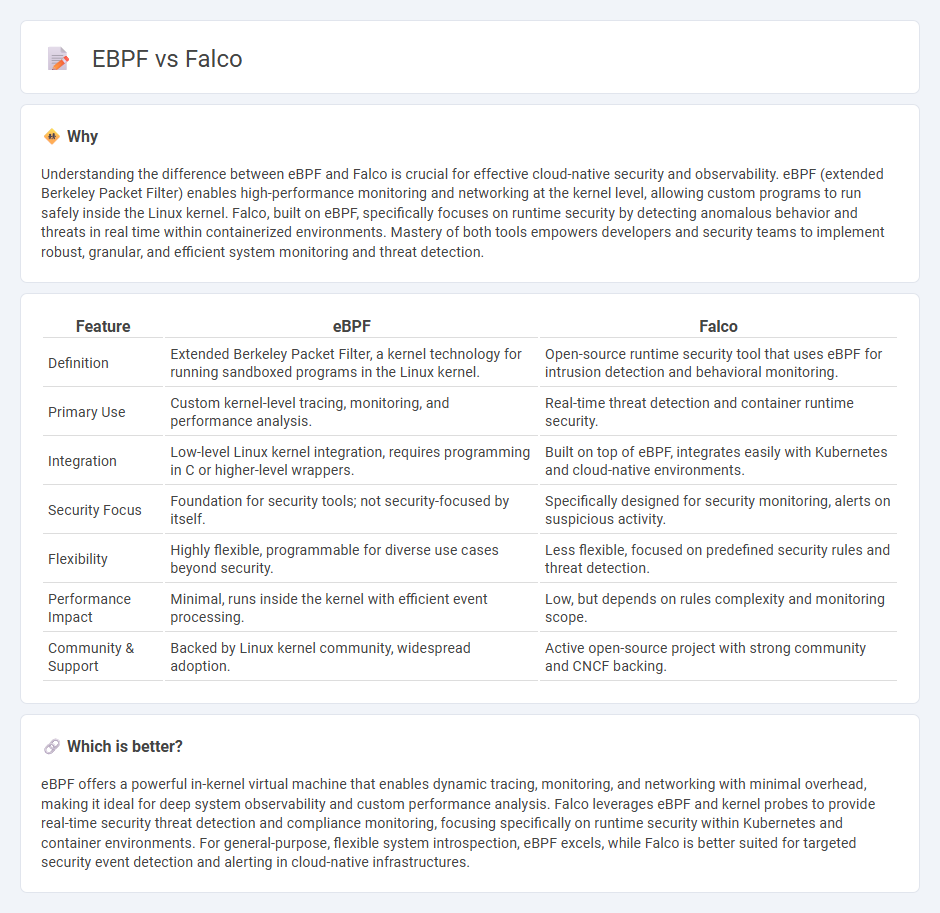
eBPF (extended Berkeley Packet Filter) enables high-performance, programmable kernel monitoring and tracing, revolutionizing Linux observability and security. Falco leverages eBPF for real-time threat detection by analyzing system call activity and unusual behavior patterns. Explore how eBPF and Falco together enhance cloud-native security and monitoring capabilities.
Why it is important
Understanding the difference between eBPF and Falco is crucial for effective cloud-native security and observability. eBPF (extended Berkeley Packet Filter) enables high-performance monitoring and networking at the kernel level, allowing custom programs to run safely inside the Linux kernel. Falco, built on eBPF, specifically focuses on runtime security by detecting anomalous behavior and threats in real time within containerized environments. Mastery of both tools empowers developers and security teams to implement robust, granular, and efficient system monitoring and threat detection.
Comparison Table
| Feature | eBPF | Falco |
|---|---|---|
| Definition | Extended Berkeley Packet Filter, a kernel technology for running sandboxed programs in the Linux kernel. | Open-source runtime security tool that uses eBPF for intrusion detection and behavioral monitoring. |
| Primary Use | Custom kernel-level tracing, monitoring, and performance analysis. | Real-time threat detection and container runtime security. |
| Integration | Low-level Linux kernel integration, requires programming in C or higher-level wrappers. | Built on top of eBPF, integrates easily with Kubernetes and cloud-native environments. |
| Security Focus | Foundation for security tools; not security-focused by itself. | Specifically designed for security monitoring, alerts on suspicious activity. |
| Flexibility | Highly flexible, programmable for diverse use cases beyond security. | Less flexible, focused on predefined security rules and threat detection. |
| Performance Impact | Minimal, runs inside the kernel with efficient event processing. | Low, but depends on rules complexity and monitoring scope. |
| Community & Support | Backed by Linux kernel community, widespread adoption. | Active open-source project with strong community and CNCF backing. |
Which is better?
eBPF offers a powerful in-kernel virtual machine that enables dynamic tracing, monitoring, and networking with minimal overhead, making it ideal for deep system observability and custom performance analysis. Falco leverages eBPF and kernel probes to provide real-time security threat detection and compliance monitoring, focusing specifically on runtime security within Kubernetes and container environments. For general-purpose, flexible system introspection, eBPF excels, while Falco is better suited for targeted security event detection and alerting in cloud-native infrastructures.
Connection
eBPF (extended Berkeley Packet Filter) enhances Linux kernel capabilities by enabling efficient, programmable tracing and monitoring without changing kernel source code. Falco leverages eBPF to provide real-time security and behavioral monitoring, detecting anomalies and unauthorized activities in cloud-native environments. The integration of eBPF and Falco delivers robust, high-performance observability and threat detection for containerized infrastructures.
Key Terms
Runtime Security
Falco leverages eBPF technology to provide comprehensive runtime security by monitoring system calls and detecting anomalous behavior in real-time. While eBPF serves as a powerful kernel-level sandbox enabling efficient tracing and observability, Falco builds on this foundation with pre-defined and customizable security rulesets for threat detection. Explore how these technologies enhance runtime threat prevention and system visibility for your cloud-native environments.
Kernel Instrumentation
Falco employs eBPF for advanced kernel instrumentation, capturing system calls and kernel events to enhance security monitoring with minimal overhead. eBPF provides a flexible and efficient framework that enables dynamic tracing and real-time analysis of kernel-level activities without modifying kernel code. Explore how the integration of Falco with eBPF revolutionizes kernel instrumentation for superior threat detection and system observability.
Event Monitoring
Falco leverages eBPF technology to provide real-time container security by monitoring system calls and generating alerts on suspicious activities. eBPF enables efficient kernel-level event monitoring, allowing Falco to capture detailed system behaviors with minimal performance impact. Explore deeper insights into how Falco and eBPF collaborate to enhance event-driven security monitoring.
Source and External Links
Falco (musician) - Wikipedia - Falco was the stage name of Johann "Hans" Holzel, an Austrian singer famous for international hits like "Der Kommissar" and "Rock Me Amadeus," the latter being the only German language song to reach No. 1 on the US Billboard charts.
Falco | Sysdig - Falco is an open source cloud-native runtime security tool used for threat detection in hosts, containers, and cloud environments, maintained by Sysdig and widely used across cloud platforms.
Falco - IMDb - Johann Holzel, known as Falco, was considered a musical prodigy and achieved global success with albums and singles in the 1980s, drawing comparisons to Mozart early in his life.
 dowidth.com
dowidth.com